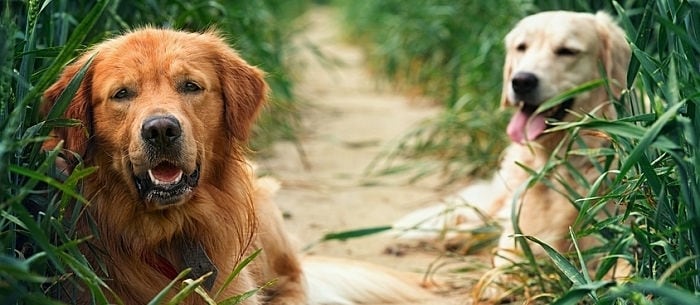You discover your little guy with a super muddy face. He’s been digging through and eating the dirt again. Why do dogs eat dirt? And mulch? And things they find on the side of the road (if you let them!)? Although you might not love your dog with his face in the dirt, chowing down on the ground is something most dogs do.
Why Do Dogs Eat Dirt?
According to The Nest, dogs will eat dirt because of mineral deficiencies, gastric upset or just because they like something they found in the dirt. But sometimes dogs will eat dirt because of something called pica, a condition where they eat inedible things.
According to the American Society for the Prevention of Cruelty to Animals (ASPCA) when your pet is eating something not considered food, this can signal a deficiency in his diet but could also mean boredom (especially in puppies). So when your dog starts to eat the earth, should you worry?
Here are some of the most common concerns when it comes to eating dirt:
- Suffering From Mineral Deficiencies
Dirt contains minerals, and if your dog starts digging with his tongue, he may need some in his diet. For example, the Dog Food Project mentions that when dogs eat grass or dirt, they may lack silicon. Make sure your dog is getting a well-balanced diet full of vitamins and minerals. If you suspect your dog’s dinner is lacking, check in with your vet. She can tell you if she sees other signs of mineral deficiency such as lackluster eyes or a less-than-shiny coat. She can help you pump those nutrients up in your dog’s diet and may even offer a multivitamin.
- Found Something They Like in The Dirt
One of the reasons dogs love to eat dirt isn’t just because of the dirt itself, but what they find in the ground. Leftover pizza, garbage, even bones — it’s a dog’s delight! Be careful, though, as there might be some highly toxic substances found on the side of the sidewalk you don’t want your dog ingesting. If the food you find is moldy, don’t let him eat it! The rule of thumb should always be, “If you wouldn’t eat it, don’t let your dog eat it.” Introduce a new chew toy at home to keep your pooch entertained.
- Dealing With Behavioral Issues
Sometimes dogs just become obsessed with eating things like dirt, grass or mulch because they like it. If you have taken your dog to the vet and ruled out medical reasons, it might just be a habit. There are some behavioral techniques you can try to get them to stop. Reward and praise him big time when he stays away from dirt, and make sure you give him lots of treats and attention so he doesn’t get bored.
- Continuing Stomach Upset
Dogs get indigestion just like you, and sometimes they eat dirt as an easy-to-find natural reliever. According to the ASPCA, when dogs eat things that aren’t food, this might signal some tummy upset. If you find pieces of vomited-up dirt or bile around, this could mean your dog has stomach issues. Try introducing fiber into your dogs diet to alleviate them.
Is Eating Dirt Safe?
According to the ASPCA, when your dog eats nonfood items, like dirt, it’s generally safe but could signal an underlying health issue. Checking in with your vet is always prudent. Pure, untreated dirt is considered fairly safe for your dog to eat. But remember containment such as pesticides can seep in.
The Humane Society of the United States warns that fertilizer and other lawn chemicals are potentially harmful. Always have your dog walker keep a watchful eye on your beloved furry friend when she’s outside. Your neighbors, vet and lawn will thank you!
To keep your pup as healthy as possible, make sure he avoids these 12 Toxic Plants for Dogs.
Amy Aitman is a freelance writer who writes lifestyle and parenting articles, including some for pet parents. She has her own little Westie, who loves a cuddle on the couch, who is now almost 14 years old. Follow her on Twitter.
*This article is for general informational purposes only. It is not intended nor implied to be providing medical advice and is not a substitute for such advice. The reader should always consult a health care provider concerning any medical condition or treatment plan. Neither Care.com nor the author assumes any responsibility or liability with respect to use of any information contained herein.





